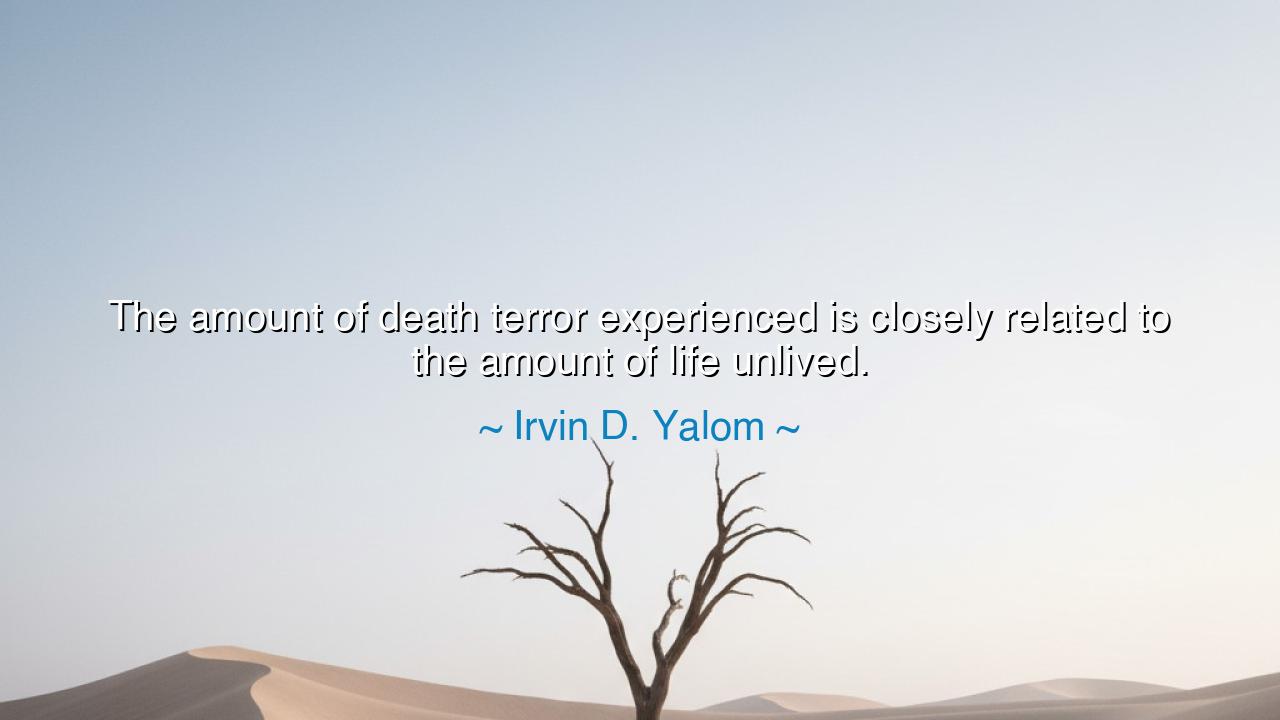
The amount of death terror experienced is closely related to the
The amount of death terror experienced is closely related to the amount of life unlived.






The words of Irvin D. Yalom, the great existential psychiatrist and philosopher of the soul, pierce the heart with quiet precision: “The amount of death terror experienced is closely related to the amount of life unlived.” In this single sentence lies a profound mirror for humanity, reflecting both our deepest fear and our greatest failure. Yalom teaches that our fear of death is not born merely from the knowledge that we will die, but from the ache of realizing that we have not truly lived. The terror we feel in facing our mortality is the shadow cast by the life we have denied ourselves—the dreams unpursued, the words unspoken, the love withheld.
This truth comes not from the ivory towers of theory, but from Yalom’s years of sitting beside the dying, listening to their final reckonings. As a healer of minds and hearts, he learned that those who had lived fully—who had embraced both joy and pain, creation and loss—met death with serenity. But those who had avoided life, who had hidden behind fear, routine, and comfort, met death with terror, for they realized too late that they had been spectators of their own existence. Thus, Yalom’s words are not a statement about death, but a call to life—to live so deeply and courageously that when death comes, it finds us already complete.
To the ancients, this was a sacred wisdom. The Stoics of old, like Seneca and Marcus Aurelius, taught that the one who learns how to live has already learned how to die. They understood that mortality is not a curse, but a teacher—that the awareness of death should not paralyze us, but awaken us. To fear death excessively is to confess that we have wasted the gift of time. The one who lives with purpose and presence carries no terror of ending, for such a soul knows that the flame of their life has burned brightly, and its light will not be lost to the world.
Consider the story of Socrates, condemned to drink the cup of poison. His friends wept, fearing his end, but he faced death with calm. “A good man,” he said, “has nothing to fear, either in life or in death.” Why? Because he had lived as he taught—with integrity, curiosity, and love for truth. There was nothing unlived within him, no regret unspoken, no duty undone. His life had been a full offering, and so death found him unafraid. His peace was not the gift of religion or superstition, but of wholeness. In him we see the embodiment of Yalom’s wisdom: the absence of death terror comes only when the soul is at peace with the life it has lived.
But many live as though life were an endless rehearsal—waiting for some future moment to begin truly living. They postpone their dreams for safety, their passions for propriety, their words of love for a “better time.” They walk carefully around pain, avoiding risk and vulnerability, not realizing that in doing so they walk also around life itself. Then, when death approaches, terror arises—not from death’s mystery, but from recognition: that their years have passed unused, that they have slept through the song of existence. The unlived life is the true source of agony, not death itself.
To live fully does not mean to chase constant pleasure or success. It means to live awake—to feel, to risk, to give, to fail, and to love with open hands. It is to know the depth of sorrow as well as the height of joy, and to accept both as the price of being human. When one has lived with such fullness, death loses its power to frighten. It becomes not a thief, but a closing of the circle. For those who have spent themselves freely in the service of meaning, death is not the end, but the final rest after a long and beautiful journey.
Lesson and Practice:
Do not wait for courage to live—begin now. Fill your days with presence, not mere motion. Pursue the dreams that stir your soul, even if they frighten you. Speak the words of love you have withheld. Forgive what you have carried too long. Accept that pain, too, is part of the feast of life. Let each day be a small victory over hesitation, and when your final hour comes, let it find you unafraid, for your life will have been your masterpiece. For as Irvin D. Yalom teaches, it is not death that we should fear—but the unlived life, which haunts us long before our final breath.






AAdministratorAdministrator
Welcome, honored guests. Please leave a comment, we will respond soon